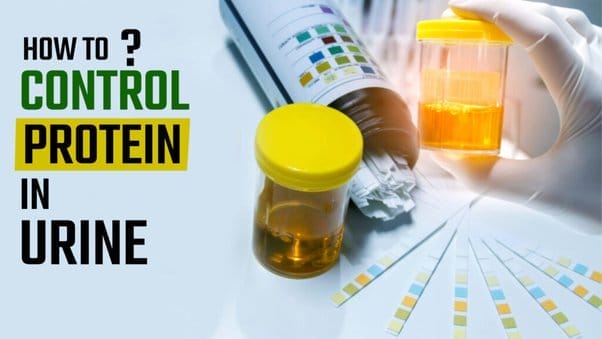Proteinuria means elevated proteins in the urine. When your kidneys are healthy, your protein in urine levels is in nthe ormal range. Proteinuria is not a disease in itself but indicates certain conditions affecting the kidneys. Too many proteins in the urine indicate that the glomeruli are not working properly and are allowing the proteins to leak into the urine. When the glomeruli in the kidneys get damaged, the condition is called nephritis or glomerulonephritis. Because of several causative circumstances, glomeruli get damaged and are unable to separate the body’s needs from waste. It causes symptoms like proteins in the urine, frothy urine, and oedema in the feet and around the eyes. This might result in various consequences, like Acute renal failure, hypertension, high cholesterol, high triglycerides, bad health, etc. Renal biopsies and urea with creatinine (protein in urine test) are also recommended for diagnosis.

Causes of Nephrotic Syndrome
Glomeruli are tiny structures that filter the blood as it goes through your kidneys. These filters separate the waste materials that are no longer required. Glomeruli aid in maintaining good blood protein balance, particularly albumin, which is necessary to keep healthy body fluid. Injured glomeruli lose their ability to hold proteins, which are then discharged in urine.
All of these contribute to nephrotic syndrome. Some Causes are:-
- Heart failure
- Amyloidosis
- Membranous nephropathy
- Diabetic kidney disease
- Blood clots in the kidney veins.
Certain medications, infections, and health conditions can contribute as risk factors for Nephrotic Syndrome.

Protein in Urine Symptoms
- Weight gain due to excess water retention
- Foamy urine
- Severe swelling or oedema around the eyes and ankles
Ayurvedic View – Ayurvedic Protein in Urine Treatment
According to Ayurveda, renal failure is caused by a blockage of minute bodily channels known as Srotas.
Mutravaha srotas are the channels that convey urine and control liquid flow into and out of the kidneys. If the incoming Srotas are blocked, the kidneys are deprived of fluids, resulting in shrinking, while when the outgoing Srotas are stopped, the swelling is observed.
Karma Ayurveda offers the most effective Ayurvedic treatment for nephrotic syndrome. These herbal medicines are made from 100% natural herbs and do not contain chemicals, binders, fillers, colours, yeast, flour, preservatives etc. A team of famous Ayurvedic doctors creates these herbal treatments.

Ayurvedic management of urinary problems
In Ayurveda, conditions affecting the urinary system and kidneys ayurvedic treatment are called Mutravahasrota Roga. Mutraghata (Mutra+ aghata) refers to illnesses of the bladder and urethra. Mutraghata has been described in 13 types, as per Madhav Nidaan.
Prameha, on the other hand, refers to a metabolic state of illnesses characterised by excessive urination (polyuria). Urinary tract disorders are induced by worsened vata dosha, as per Ayurveda. But, they can be treated with diuretics (mutra-virechana). This accelerates the urine flow and balances the vata dosha’s downward flow.
Ayurvedic diet for urinary problems
- Reduce the inclusion of hot spices in your diet. Drink a little more than the required amount of water. Fresh lemon juice, fresh coconut water, orange juice, sugarcane juice, and pineapple juice could be very beneficial.
- Ayurveda promotes the consumption of seasonal fruits and vegetables in abundant quantities.
- Lactobacilli bacteria are probiotics that help correct the imbalances caused by bacterial infections.
- Cinnamon has an antibacterial effect on E.coli, which is responsible for disorders of the urinary tract. Ayurveda recommends using cinnamon as a healing spice in cooking or as herbal tea.
- Cardamom spice is found to have diuretic properties. Chewing cardamom pods daily helps to cleanse the urinary system. It also helps to combat infections.
- A coriander drink helps to nourish and cool the urinary tract. It also flushes out toxins.
Ayurvedic lifestyle for urinary problems
- Reduce exposure to scorching weather and direct sun.
- Do not hold the urge to urinate. It leads to retaining toxins in your system.
- Avoid places with high dampness and moisture that can be causative to urinary infections.
- For incontinence problems, strengthen the pelvic muscles. One can include yoga asanas also, like cow’s face pose, wind-relieving pose, half spinal twist pose, raised leg pose, legs up the wall pose etc.

Panchakarma for urinary tract disorders
Ayurveda says that when your vata, pitta, and kapha doshas are balanced, you are in pink health. An imbalance of these doshas may cause many problems, one of which is Urinary tract disorders. Ayurvedic treatment for urinary tract disorders involves flushing out infections, detoxifying, and clearing out urinary tract blockages. All these are done with the help of herbs that help tone the kidneys and normalise the functioning of Apana Vayu (vata).
Panchakarma is the holistic method to eliminate toxins and the root cause of the disease. An experienced kidney specialist ayurvedic doctor will design a tailored treatment plan per your needs.
Conclusion
This article is intended for reference purposes only. With a team of experienced ayurvedic doctors, Karma Ayurveda online store helps combat urinary disorders using herbal medicines. The specifically designed treatment plan includes medications, diet therapy and yoga asanas.

